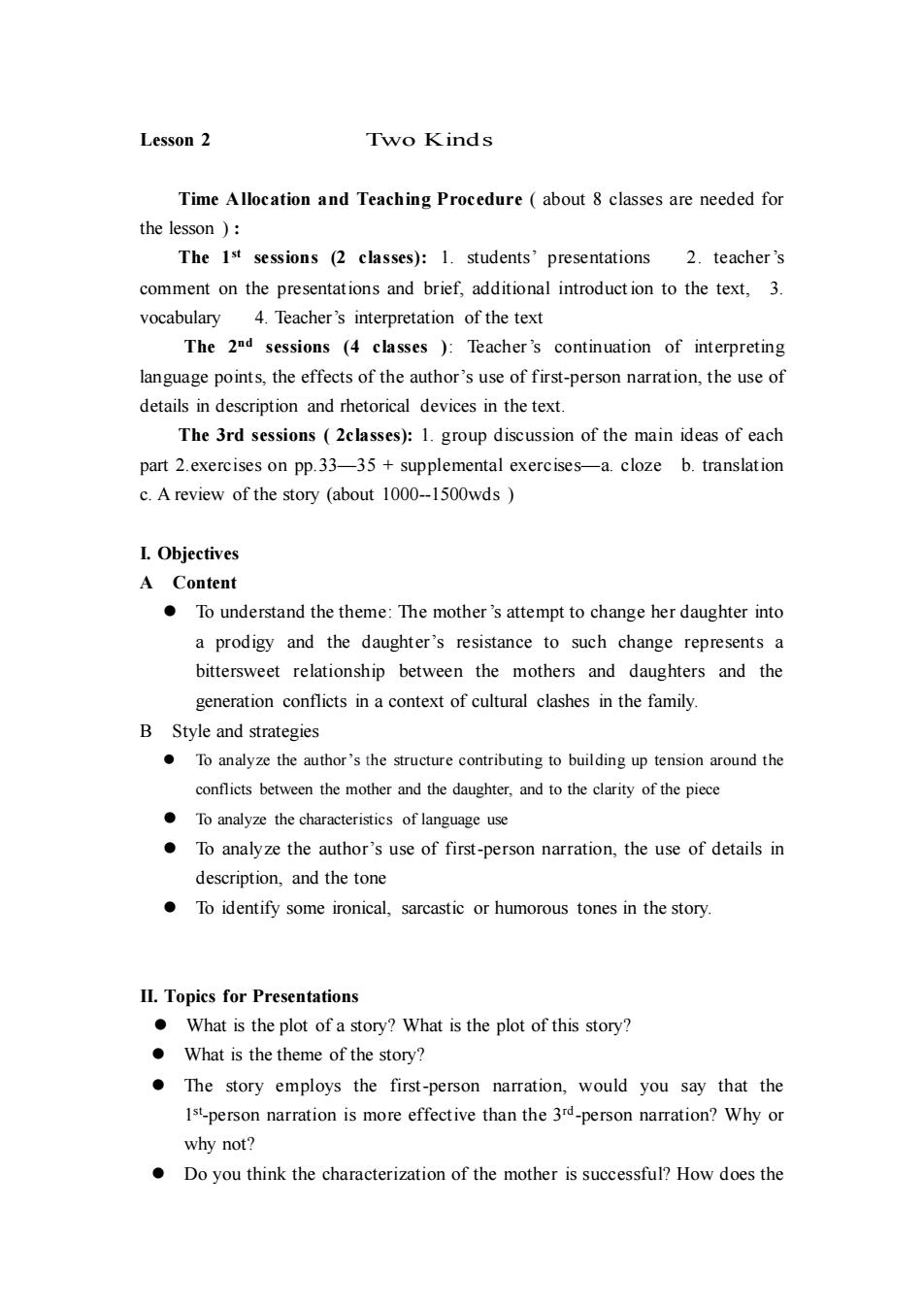
Lesson 2 Two Kinds Time Allocation and Teaching Procedure about 8 classes are needed for the lesson): The 1st sessions (2 classes):1.students'presentations 2.teacher's comment on the presentations and brief,additional introduct ion to the text,3. vocabulary 4.Teacher's interpretation of the text The 2nd sessions (4 classes )Teacher's continuation of interpreting language points,the effects of the author's use of first-person narration,the use of details in description and rhetorical devices in the text. The 3rd sessions (2classes):1.group discussion of the main ideas of each part 2.exercises on pp.33-35+supplemental exercises-a.cloze b.translation c.A review of the story (about 1000-1500wds) I.Objectives A Content To understand the theme:The mother's attempt to change her daughter into a prodigy and the daughter's resistance to such change represents a bittersweet relationship between the mothers and daughters and the generation conflicts in a context of cultural clashes in the family. B Style and strategies Toanalyze the author's the structure contributing to building up tension around the conflicts between the mother and the daughter,and to the clarity of the piece To analyze the characteristics of language use Toanalyze the author's use of first-person narration,the use of details in description,and the tone To identify some ironical,sarcastic or humorous tones in the story. II.Topics for Presentations What is the plot of a story?What is the plot of this story? What is the theme of the story? The story employs the first-person narration,would you say that the 1st-person narration is more effective than the 3-person narration?Why or why not? Do you think the characterization of the mother is successful?How does the
Lesson 2 Two Kinds Time Allocation and Teaching Procedure ( about 8 classes are needed for the lesson ) : The 1st sessions (2 classes): 1. students’ presentations 2. teacher’s comment on the presentations and brief, additional introduct ion to the text, 3. vocabulary 4. Teacher’s interpretation of the text The 2nd sessions (4 classes ): Teacher’s continuation of interpreting language points, the effects of the author’s use of first-person narration, the use of details in description and rhetorical devices in the text. The 3rd sessions ( 2classes): 1. group discussion of the main ideas of each part 2.exercises on pp.33—35 + supplemental exercises—a. cloze b. translation c. A review of the story (about 1000-1500wds ) I. Objectives A Content ⚫ To understand the theme: The mother’s attempt to change her daughter into a prodigy and the daughter’s resistance to such change represents a bittersweet relationship between the mothers and daughters and the generation conflicts in a context of cultural clashes in the family. B Style and strategies ⚫ To analyze the author’s the structure contributing to building up tension around the conflicts between the mother and the daughter, and to the clarity of the piece ⚫ To analyze the characteristics of language use ⚫ To analyze the author’s use of first-person narration, the use of details in description, and the tone ⚫ To identify some ironical, sarcastic or humorous tones in the story. II. Topics for Presentations ⚫ What is the plot of a story? What is the plot of this story? ⚫ What is the theme of the story? ⚫ The story employs the first-person narration, would you say that the 1 st -person narration is more effective than the 3rd -person narration? Why or why not? ⚫ Do you think the characterization of the mother is successful? How does the
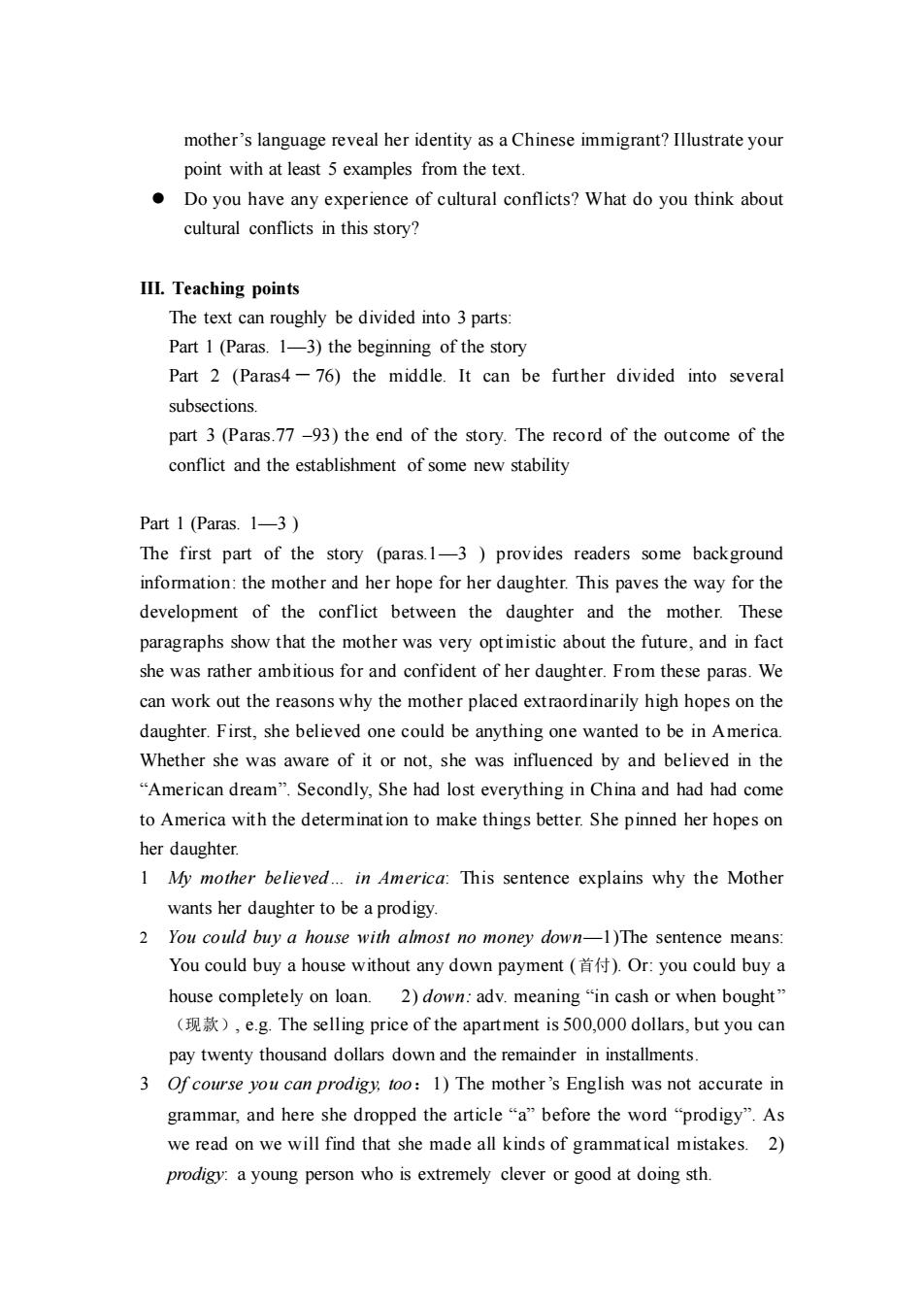
mother's language reveal her identity as a Chinese immigrant?Illustrate your point with at least 5 examples from the text. Do you have any experience of cultural conflicts?What do you think about cultural conflicts in this story? III.Teaching points The text can roughly be divided into 3 parts: Part 1(Paras.1-3)the beginning of the story Part 2 (Paras4-76)the middle.It can be further divided into several subsections. part 3(Paras.77-93)the end of the story.The record of the outcome of the conflict and the establishment of some new stability Part 1 (Paras.1-3) The first part of the story (paras.1-3 )provides readers some background information:the mother and her hope for her daughter.This paves the way for the development of the conflict between the daughter and the mother.These paragraphs show that the mother was very optimistic about the future,and in fact she was rather ambitious for and confident of her daughter.From these paras.We can work out the reasons why the mother placed extraordinarily high hopes on the daughter.First,she believed one could be anything one wanted to be in America. Whether she was aware of it or not,she was influenced by and believed in the "American dream".Secondly,She had lost everything in China and had had come to America with the determination to make things better.She pinned her hopes on her daughter 1 My mother believed.in America:This sentence explains why the Mother wants her daughter to be a prodigy. 2 You could buy a house with almost no money down-1)The sentence means: You could buy a house without any down payment )Or:you could buy a house completely on loan.2)down:adv.meaning"in cash or when bought" (),e.g.The selling price of the apartment is 500.000 dollars,but you can pay twenty thousand dollars down and the remainder in installments. 3 Ofcourse you can prodigy.too:1)The mother's English was not accurate in grammar,and here she dropped the article"a"before the word"prodigy".As we read on we will find that she made all kinds of grammatical mistakes.2) prodigy.a young person who is extremely clever or good at doing sth
mother’s language reveal her identity as a Chinese immigrant? Illustrate your point with at least 5 examples from the text. ⚫ Do you have any experience of cultural conflicts? What do you think about cultural conflicts in this story? III. Teaching points The text can roughly be divided into 3 parts: Part 1 (Paras. 1—3) the beginning of the story Part 2 (Paras4- 76) the middle. It can be further divided into several subsections. part 3 (Paras.77 –93) the end of the story. The record of the outcome of the conflict and the establishment of some new stability Part 1 (Paras. 1—3 ) The first part of the story (paras.1—3 ) provides readers some background information: the mother and her hope for her daughter. This paves the way for the development of the conflict between the daughter and the mother. These paragraphs show that the mother was very optimistic about the future, and in fact she was rather ambitious for and confident of her daughter. From these paras. We can work out the reasons why the mother placed extraordinarily high hopes on the daughter. First, she believed one could be anything one wanted to be in America. Whether she was aware of it or not, she was influenced by and believed in the “American dream”. Secondly, She had lost everything in China and had had come to America with the determination to make things better. She pinned her hopes on her daughter. 1 My mother believed. in America: This sentence explains why the Mother wants her daughter to be a prodigy. 2 You could buy a house with almost no money down—1)The sentence means: You could buy a house without any down payment (首付). Or: you could buy a house completely on loan. 2) down: adv. meaning “in cash or when bought ” (现款), e.g. The selling price of the apartment is 500,000 dollars, but you can pay twenty thousand dollars down and the remainder in installments. 3 Of course you can prodigy, too:1) The mother’s English was not accurate in grammar, and here she dropped the article “a” before the word “prodigy”. As we read on we will find that she made all kinds of grammatical mistakes. 2) prodigy: a young person who is extremely clever or good at doing sth
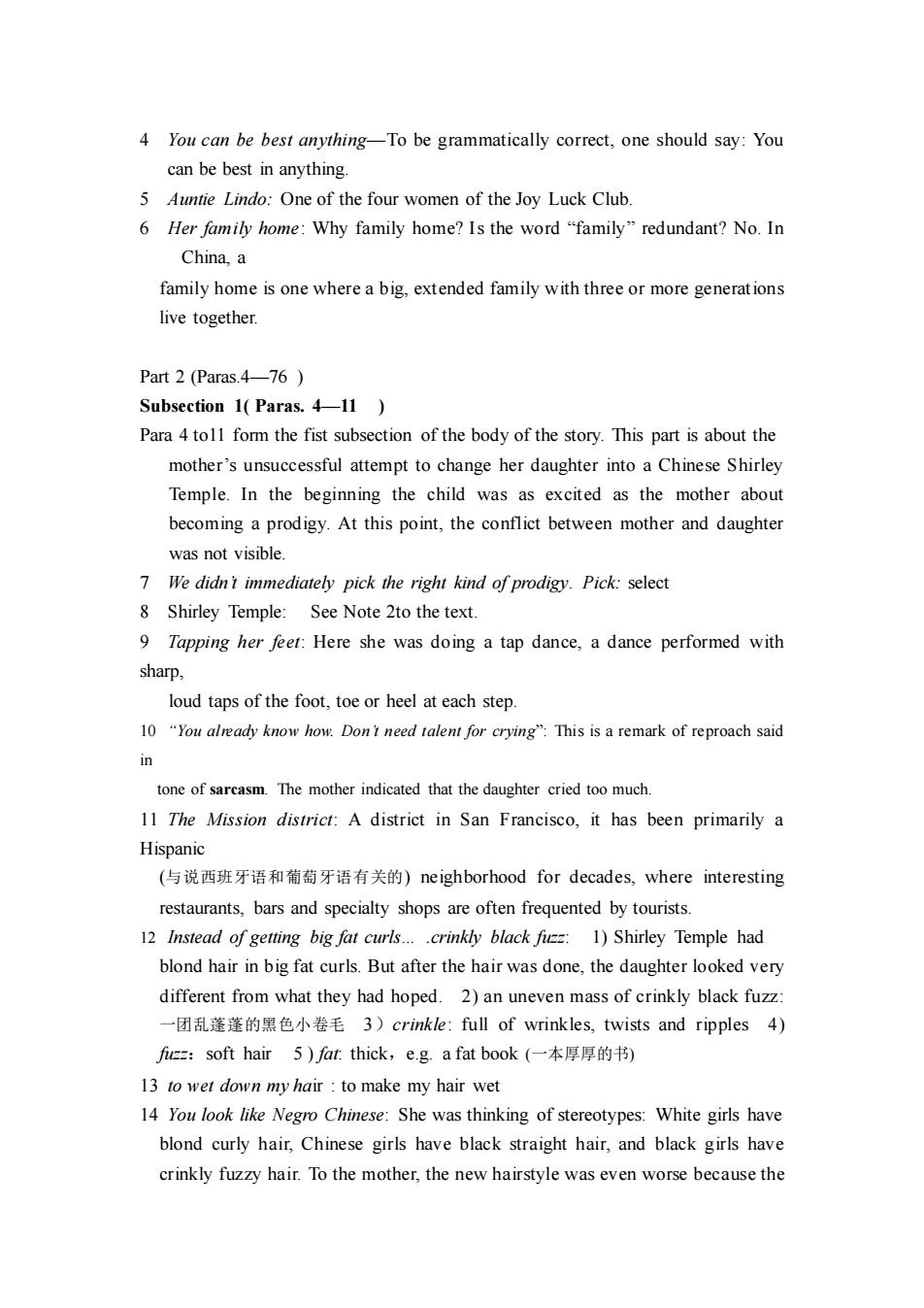
4 You can be best anything-To be grammatically correct,one should say:You can be best in anything. 5 Auntie Lindo:One of the four women of the Joy Luck Club. 6 Her family home:Why family home?Is the word"family"redundant?No.In China,a family home is one where a big,extended family with three or more generations live together. Part 2(Paras 4-76 Subsection 1(Paras.4-11 Para 4 toll form the fist subsection of the body of the story.This part is about the mother's unsuccessful attempt to change her daughter into a Chinese Shirley Temple.In the beginning the child was as excited as the mother about becoming a prodigy.At this point,the conflict between mother and daughter was not visible. 7 We didnt immediately pick the right kind of prodigy.Pick:select 8 Shirley Temple:See Note 2to the text. 9 Tapping her feer:Here she was doing a tap dance,a dance performed with sharp, loud taps of the foot,toe or heel at each step. 10"You already know how Dont need talent for crying"This is a remark of reproach said tone of sarcasm.The mother indicated that the daughter cried too much. 11 The Mission district:A district in San Francisco,it has been primarily a Hispanic (与说西班牙语和葡萄牙语有关的)neighborhood for decades,where interesting restaurants,bars and specialty shops are often frequented by tourists. 12 Instead of geting big fat curls.crinkly black fiz:1)Shirley Temple had blond hair in big fat curls.But after the hair was done,the daughter looked very different from what they had hoped.2)an uneven mass of crinkly black fuzz: 一团乱蓬蓬的黑色小卷毛3)crinkle:full of wrinkles,.twists and ripples4) fica:soft hair5)fat.thick,eg.a fat book(一本厚厚的书) 13 to wet down my hair to make my hair wet 14 You look like Negro Chinese:She was thinking of stereotypes:White girls have blond curly hair,Chinese girls have black straight hair,and black girls have crinkly fuzzy hair.To the mother,the new hairstyle was even worse because the
4 You can be best anything—To be grammatically correct, one should say: You can be best in anything. 5 Auntie Lindo: One of the four women of the Joy Luck Club. 6 Her family home: Why family home? Is the word “family” redundant? No. In China, a family home is one where a big, extended family with three or more generations live together. Part 2 (Paras.4—76 ) Subsection 1( Paras. 4—11 ) Para 4 to11 form the fist subsection of the body of the story. This part is about the mother’s unsuccessful attempt to change her daughter into a Chinese Shirley Temple. In the beginning the child was as excited as the mother about becoming a prodigy. At this point, the conflict between mother and daughter was not visible. 7 We didn’t immediately pick the right kind of prodigy. Pick: select 8 Shirley Temple: See Note 2to the text. 9 Tapping her feet: Here she was doing a tap dance, a dance performed with sharp, loud taps of the foot, toe or heel at each step. 10 “You already know how. Don’t need talent for crying”: This is a remark of reproach said in tone of sarcasm. The mother indicated that the daughter cried too much. 11 The Mission district: A district in San Francisco, it has been primarily a Hispanic (与说西班牙语和葡萄牙语有关的) neighborhood for decades, where interesting restaurants, bars and specialty shops are often frequented by tourists. 12 Instead of getting big fat curls. .crinkly black fuzz: 1) Shirley Temple had blond hair in big fat curls. But after the hair was done, the daughter looked very different from what they had hoped. 2) an uneven mass of crinkly black fuzz: 一团乱蓬蓬的黑色小卷毛 3)crinkle: full of wrinkles, twists and ripples 4) fuzz:soft hair 5 ) fat: thick,e.g. a fat book (一本厚厚的书) 13 to wet down my hair : to make my hair wet 14 You look like Negro Chinese: She was thinking of stereotypes: White girls have blond curly hair, Chinese girls have black straight hair, and black girls have crinkly fuzzy hair. To the mother, the new hairstyle was even worse because the
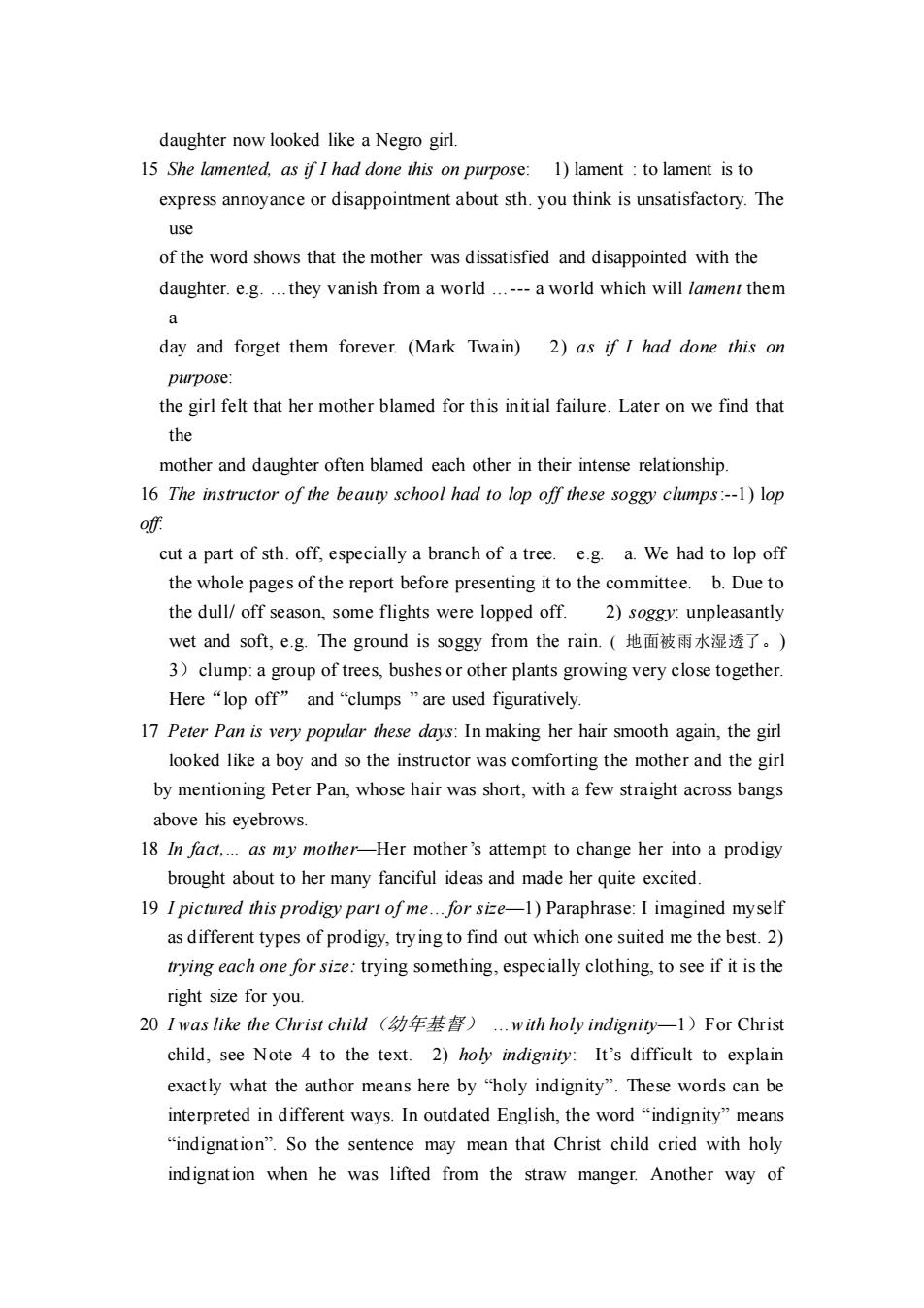
daughter now looked like a Negro girl. 15 She lamented.as if l had done this on purpose:1)lament:to lament is to express annoyance or disappointment about sth.you think is unsatisfactory.The use of the word shows that the mother was dissatisfied and disappointed with the daughter.e.g.they vanish from a world.-a world which will lament them day and forget them forever.(Mark Twain)2)as if I had done this on purpose: the girl felt that her mother blamed for this initial failure.Later on we find that the mother and daughter often blamed each other in their intense relationship. 16 The instructor of the beauty school had to lop off these soggy clumps:-1)lop cut a part of sth.off,especially a branch of a tree.e.g.a.We had to lop off the whole pages of the report before presenting it to the committee.b.Due to the dull/off season,some flights were lopped off.2)soggy:unpleasantly wet and soft,.e.g.The ground is soggy from the rain.(地面被雨水湿透了。) 3)clump:a group of trees,bushes or other plants growing very close together Here“lop off”and“clumps”are used figuratively. 17 Peter Pan is very popular these days:In making her hair smooth again,the girl looked like a boy and so the instructor was comforting the mother and the gir by mentioning Peter Pan,whose hair was short,with a few straight across bangs above his eyebrows. 18 In fact.as my mother-Her mother's attempt to change her into a prodigy brought about to her many fanciful ideas and made her quite excited. 19 Ipictured this prodigy part ofme.for sie-1)Paraphrase:I imagined myself as different types of prodigy,trying to find out which one suited me the best.2) trying each one for size:trying something,especially clothing,to see if it is the right size for you. 20 Iwas like the Christ child(幼年基督).with holy indigni0-1)For Christ child,see Note 4 to the text.2)holy indignity:It's difficult to explain exactly what the author means here by "holy indignity".These words can be interpreted in different ways.In outdated English,the word"indignity"means "indignation".So the sentence may mean that Christ child cried with holy indignation when he was lifted from the straw manger.Another way of
daughter now looked like a Negro girl. 15 She lamented, as if I had done this on purpose: 1) lament : to lament is to express annoyance or disappointment about sth. you think is unsatisfactory. The use of the word shows that the mother was dissatisfied and disappointed with the daughter. e.g. .they vanish from a world .- a world which will lament them a day and forget them forever. (Mark Twain) 2) as if I had done this on purpose: the girl felt that her mother blamed for this initial failure. Later on we find that the mother and daughter often blamed each other in their intense relationship. 16 The instructor of the beauty school had to lop off these soggy clumps:-1) lop off: cut a part of sth. off, especially a branch of a tree. e.g. a. We had to lop off the whole pages of the report before presenting it to the committee. b. Due to the dull/ off season, some flights were lopped off. 2) soggy: unpleasantly wet and soft, e.g. The ground is soggy from the rain. ( 地面被雨水湿透了。) 3)clump: a group of trees, bushes or other plants growing very close together. Here“lop off” and “clumps ” are used figuratively. 17 Peter Pan is very popular these days: In making her hair smooth again, the girl looked like a boy and so the instructor was comforting the mother and the girl by mentioning Peter Pan, whose hair was short, with a few straight across bangs above his eyebrows. 18 In fact,. as my mother—Her mother’s attempt to change her into a prodigy brought about to her many fanciful ideas and made her quite excited. 19 I pictured this prodigy part of me.for size—1) Paraphrase: I imagined myself as different types of prodigy, trying to find out which one suited me the best. 2) trying each one for size: trying something, especially clothing, to see if it is the right size for you. 20 I was like the Christ child(幼年基督) .with holy indignity—1)For Christ child, see Note 4 to the text. 2) holy indignity: It’s difficult to explain exactly what the author means here by “holy indignity”. These words can be interpreted in different ways. In outdated English, the word “indignity” means “indignation”. So the sentence may mean that Christ child cried with holy indignation when he was lifted from the straw manger. Another way of
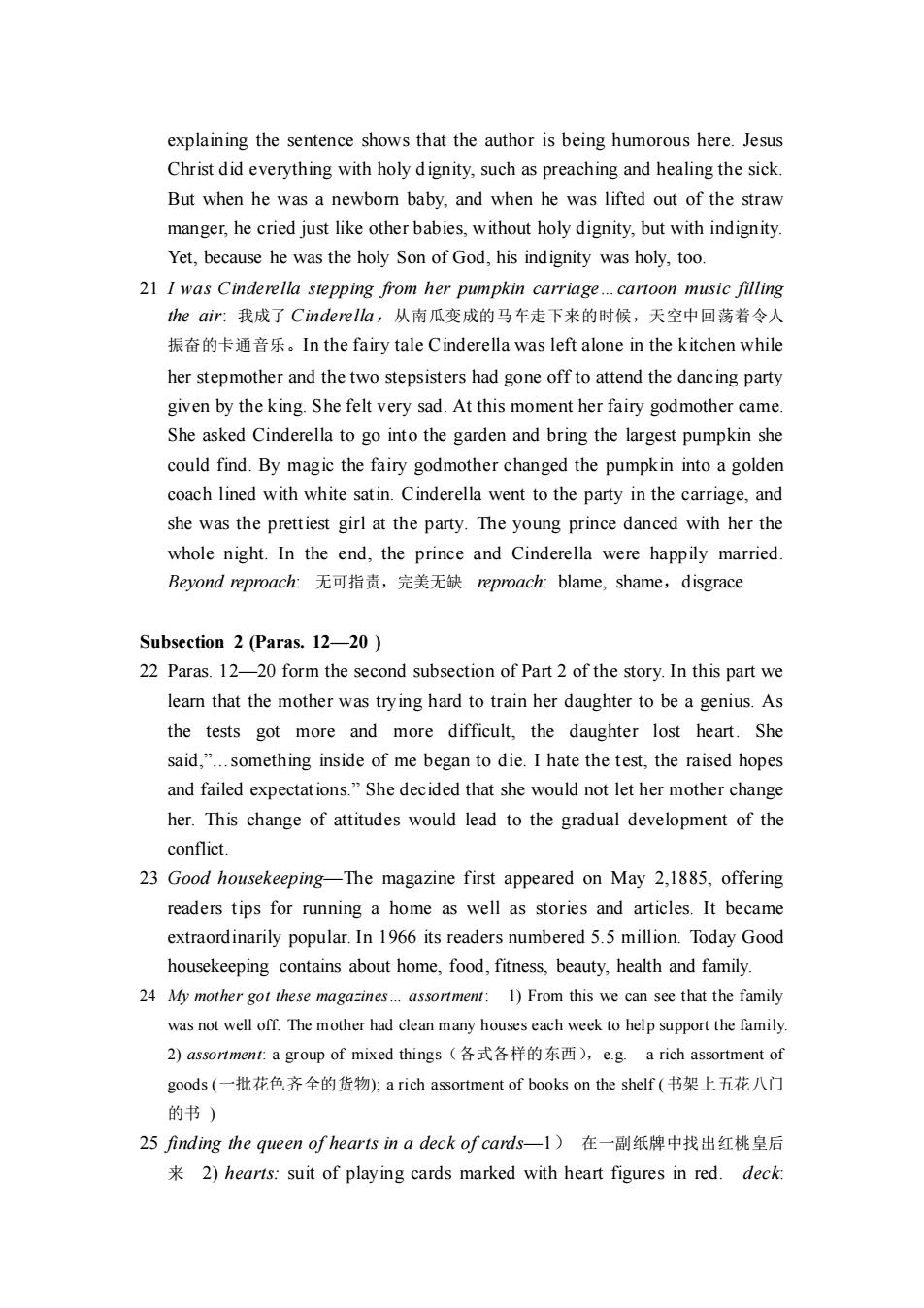
explaining the sentence shows that the author is being humorous here.Jesus Christ did everything with holy dignity,such as preaching and healing the sick. But when he was a newbom baby,and when he was lifted out of the straw manger,he cried just like other babies,without holy dignity,but with indignity Yet.because he was the holy Son of God.his indignity was holy.too. 21 I was Cinderella stepping from her pumpkin carriage.cartoon music filling the air:我成了Cinderella,从南瓜变成的马车走下来的时候,天空中回荡着令人 振奋的卡通音乐。In the fairy tale Cinderella was left alone in the kitchen while her stepmother and the two stepsisters had gone off to attend the dancing party given by the king.She felt very sad.At this moment her fairy godmother came She asked Cinderella to go into the garden and bring the largest pumpkin she could find.By magic the fairy godmother changed the pumpkin into a golden coach lined with white satin.Cinderella went to the party in the carriage,and she was the prettiest girl at the party.The young prince danced with her the whole night.In the end,the prince and Cinderella were happily married. Beyond reproach:无可指责,完美无缺reproach:.blame,.shame,disgrace Subsection 2(Paras.12-20) 22 Paras.12-20 form the second subsection of Part 2 of the story.In this part we leam that the mother was trying hard to train her daughter to be a genius.As the tests got more and more difficult,the daughter lost heart.She said,".something inside of me began to die.I hate the test,the raised hopes and failed expectations."She decided that she would not let her mother change her.This change of attitudes would lead to the gradual development of the conflict. 23 Good housekeeping-The magazine first appeared on May 2,1885,offering readers tips for running a home as well as stories and articles.It became extraordinarily popular.In1966 its readers numbered 5.5 million.Today Good housekeeping contains about home,food,fitness,beauty,health and family. 24 My mother got these maga-ines.assortment:1)From this we can see that the family was not well off.The mother had clean many houseseach week to help support the family 2)assortment::a group of mixed things(各式各样的东西),c.g.a rich assortment of goods(一批花色齐全的货物),a rich assortment of books on the shelf(书架上五花八门 的书) 25 finding the queen of hearts in a deck of cards-一】)在一副纸牌中找出红桃皇后 2)hearts:suit of playing cards marked with heart figures in red.deck
explaining the sentence shows that the author is being humorous here. Jesus Christ did everything with holy dignity, such as preaching and healing the sick. But when he was a newborn baby, and when he was lifted out of the straw manger, he cried just like other babies, without holy dignity, but with indignity. Yet, because he was the holy Son of God, his indignity was holy, too. 21 I was Cinderella stepping from her pumpkin carriage.cartoon music filling the air: 我成了 Cinderella,从南瓜变成的马车走下来的时候,天空中回荡着令人 振奋的卡通音乐。In the fairy tale Cinderella was left alone in the kitchen while her stepmother and the two stepsisters had gone off to attend the dancing party given by the king. She felt very sad. At this moment her fairy godmother came. She asked Cinderella to go into the garden and bring the largest pumpkin she could find. By magic the fairy godmother changed the pumpkin into a golden coach lined with white satin. Cinderella went to the party in the carriage, and she was the prettiest girl at the party. The young prince danced with her the whole night. In the end, the prince and Cinderella were happily married. Beyond reproach: 无可指责,完美无缺 reproach: blame, shame,disgrace Subsection 2 (Paras. 12—20 ) 22 Paras. 12—20 form the second subsection of Part 2 of the story. In this part we learn that the mother was trying hard to train her daughter to be a genius. As the tests got more and more difficult, the daughter lost heart. She said,”.something inside of me began to die. I hate the test, the raised hopes and failed expectations.” She decided that she would not let her mother change her. This change of attitudes would lead to the gradual development of the conflict. 23 Good housekeeping—The magazine first appeared on May 2,1885, offering readers tips for running a home as well as stories and articles. It became extraordinarily popular. In 1966 its readers numbered 5.5 million. Today Good housekeeping contains about home, food, fitness, beauty, health and family. 24 My mother got these magazines. assortment: 1) From this we can see that the family was not well off. The mother had clean many houses each week to help support the family. 2) assortment: a group of mixed things(各式各样的东西),e.g. a rich assortment of goods (一批花色齐全的货物); a rich assortment of books on the shelf (书架上五花八门 的书 ) 25 finding the queen of hearts in a deck of cards—1) 在一副纸牌中找出红桃皇后 来 2) hearts: suit of playing cards marked with heart figures in red. deck:
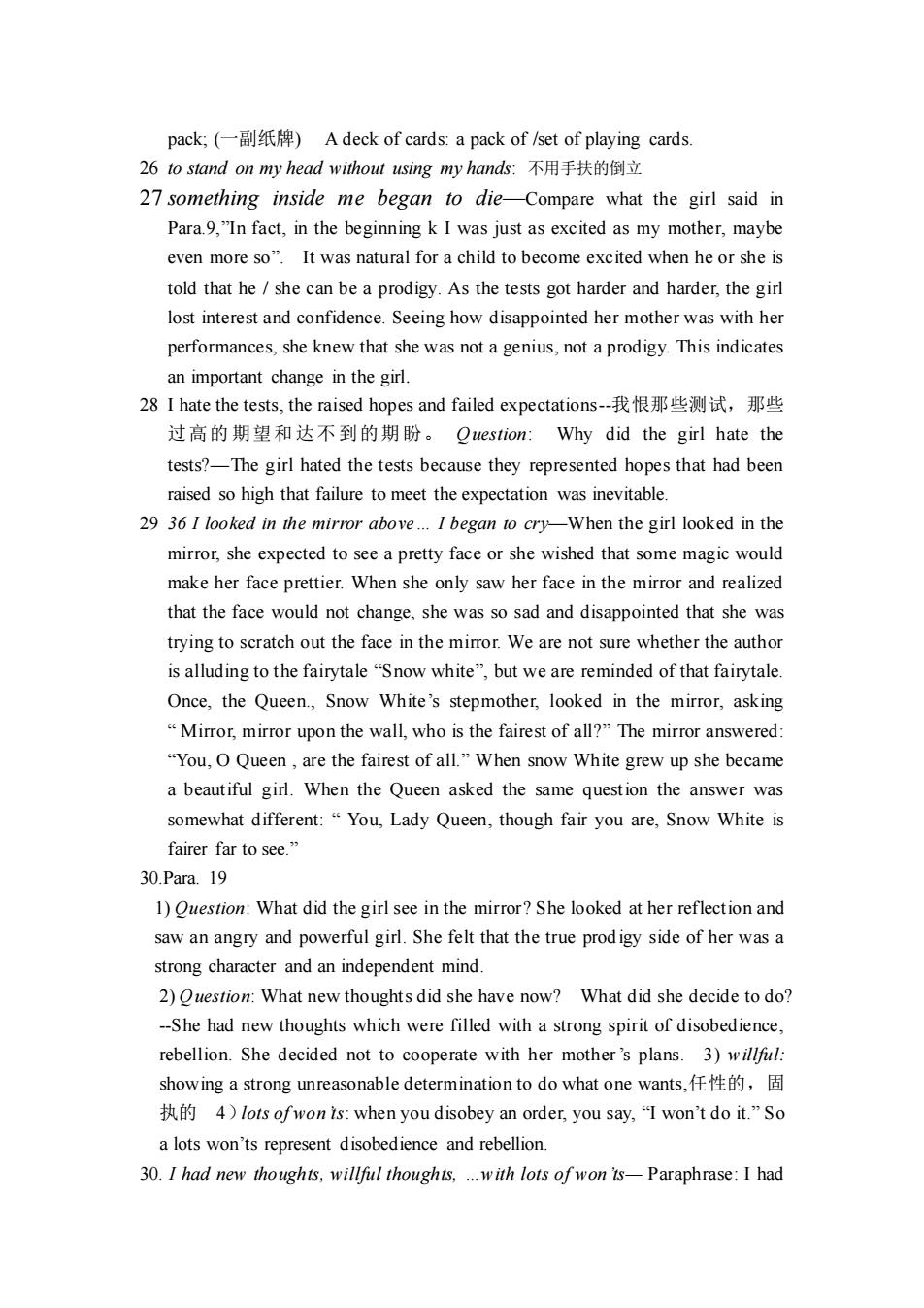
pack一副纸牌)Adeck of cards:a pack of//set of playing cards 261 stand on my head without using my hands:不用手扶的倒立 27 something inside me began to die-Compare what the girl said in Para.9,"In fact.in the beginning k I was just as excited as my mother,maybe even more so".It was natural for a child to become excited when he or she is told that he she can be a prodigy.As the tests got harder and harder,the girl lost interest and confidence.Seeing how disappointed her mother was with her performances,she knew that she was not a genius,not a prodigy.This indicates an important change in the girl. 28 I hate the tests,.the raised hopes and failed expectations-我恨那些测试,那些 过高的期望和达不到的期盼。Question:Why did the girl hate the tests?-The girl hated the tests because they represented hopes that had been raised so high that failure to meet the expectation was inevitable. 29 36 I looked in the mirror above.I began to cry-When the girl looked in the mirror,she expected to see a pretty face or she wished that some magic would make her face prettier.When she only saw her face in the mirror and realized that the face would not change,she was so sad and disappointed that she was trying to scratch out the face in the mirror.We are not sure whether the author is alluding to the fairytale"Snow white",but we are reminded of that fairytale Once,the Queen.,Snow White's stepmother,looked in the mirror,asking "Mirror,mirror upon the wall,who is the fairest of all?"The mirror answered: "You,O Queen,are the fairest of all."When snow White grew up she became a beautiful girl.When the Queen asked the same question the answer was somewhat different:"You,Lady Queen,though fair you are,Snow White is fairer far to see.” 30.Para.19 1)Ouestion:What did the girl see in the mirror?She looked at her reflection and saw an angry and powerful girl.She felt that the true prodigy side of her was a strong character and an independent mind. 2)Question:What new thoughts did she have now?What did she decide to do? -She had new thoughts which were filled with a strong spirit of disobedience rebellion.She decided not to cooperate with her mother's plans.3)willfil: showing a strong unreasonable determination to do what one wants,任性的,固 4)lots ofwon is:when you disobey an order,you say,"I won't do it."So a lots won'ts represent disobedience and rebellion. 30.I had new thoughts.willful thoughts.with lots ofwon'-Paraphrase:I had
pack; (一副纸牌) A deck of cards: a pack of /set of playing cards. 26 to stand on my head without using my hands: 不用手扶的倒立 27 something inside me began to die—Compare what the girl said in Para.9,”In fact, in the beginning k I was just as excited as my mother, maybe even more so”. It was natural for a child to become excited when he or she is told that he / she can be a prodigy. As the tests got harder and harder, the girl lost interest and confidence. Seeing how disappointed her mother was with her performances, she knew that she was not a genius, not a prodigy. This indicates an important change in the girl. 28 I hate the tests, the raised hopes and failed expectations-我恨那些测试,那些 过高的 期望和 达不 到的期 盼。 Question: Why did the girl hate the tests?—The girl hated the tests because they represented hopes that had been raised so high that failure to meet the expectation was inevitable. 29 36 I looked in the mirror above. I began to cry—When the girl looked in the mirror, she expected to see a pretty face or she wished that some magic would make her face prettier. When she only saw her face in the mirror and realized that the face would not change, she was so sad and disappointed that she was trying to scratch out the face in the mirror. We are not sure whether the author is alluding to the fairytale “Snow white”, but we are reminded of that fairytale. Once, the Queen., Snow White’s stepmother, looked in the mirror, asking “ Mirror, mirror upon the wall, who is the fairest of all?” The mirror answered: “You, O Queen , are the fairest of all.” When snow White grew up she became a beautiful girl. When the Queen asked the same question the answer was somewhat different: “ You, Lady Queen, though fair you are, Snow White is fairer far to see.” 30.Para. 19 1) Question: What did the girl see in the mirror? She looked at her reflection and saw an angry and powerful girl. She felt that the true prodigy side of her was a strong character and an independent mind. 2) Question: What new thoughts did she have now? What did she decide to do? -She had new thoughts which were filled with a strong spirit of disobedience, rebellion. She decided not to cooperate with her mother’s plans. 3) willful: showing a strong unreasonable determination to do what one wants,任性的,固 执的 4)lots of won’ts: when you disobey an order, you say, “I won’t do it.” So a lots won’ts represent disobedience and rebellion. 30. I had new thoughts, willful thoughts, .with lots of won’ts— Paraphrase: I had
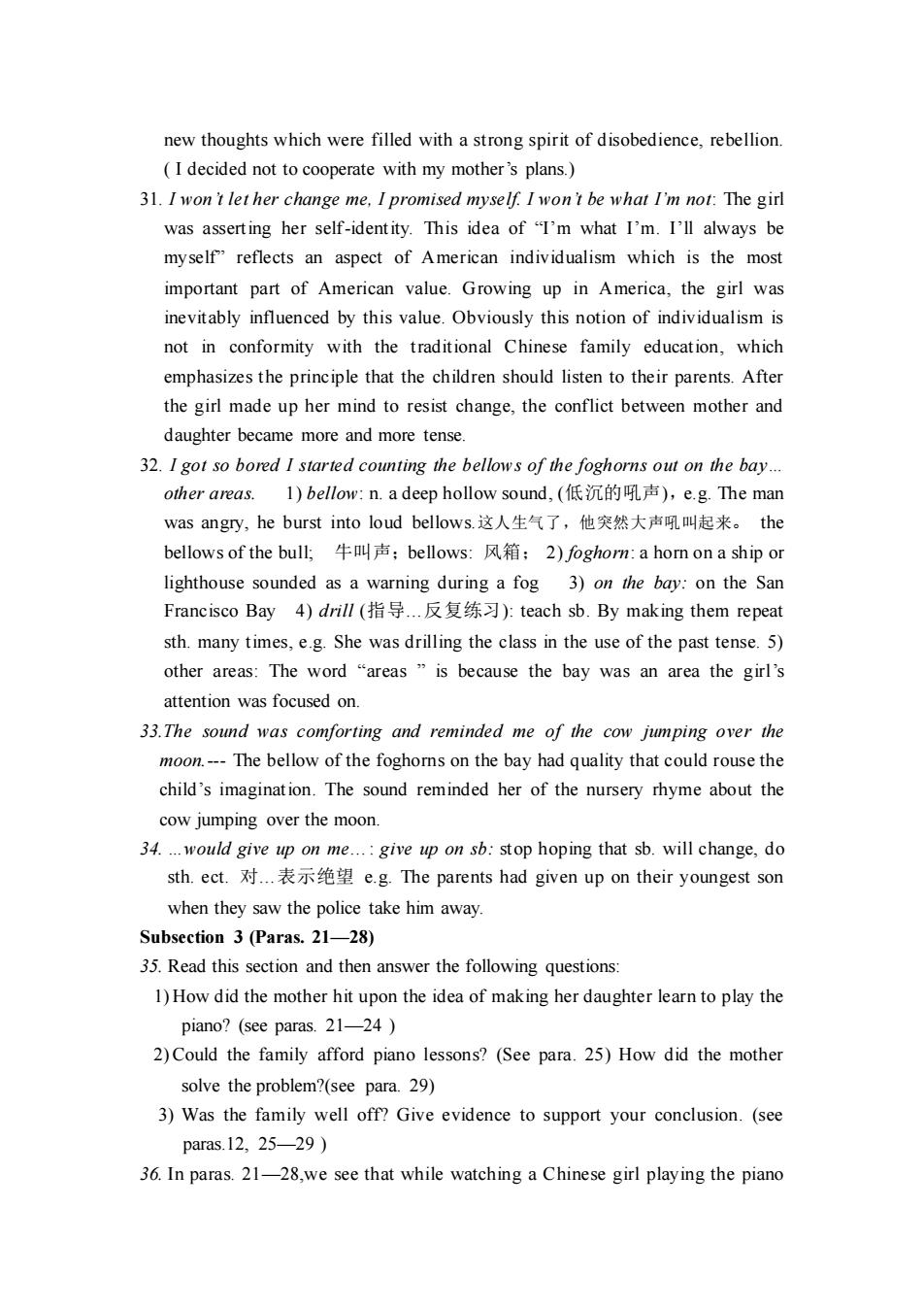
new thoughts which were filled with a strong spirit of disobedience,rebellion (I decided not to cooperate with my mother's plans.) 31.I won't let her change me,I promised myself.I won't be what I'm not:The girl was asserting her self-identity.This idea of"I'm what I'm.I'll always be myself reflects an aspect of American individualism which is the most important part of American value.Growing up in America,the girl was inevitably influenced by this value.Obviously this notion of individualism is not in conformity with the traditional Chinese family education,which emphasizes the principle that the children should listen to their parents.After the girl made up her mind to resist change,the conflict between mother and daughter became more and more tense. 32.I got so bored I started counting the bellows of the foghorns out on the bay. other areas. 1)bellow:n.a deep hollow sound,(低沉的吼声),e.g.The man was angry,he burst into loud bellows.这人生气了,他突然大声吼叫起来。the bellows of the bull.牛叫声;bellows::风箱:2)foghorn:a hom on a ship or lighthouse sounded as a warning during a fog 3)on the bay:on the San Francisco Bay4)dill(指导.反复练习)teach sb.By making them repeat sth.many times,e.g.She was drilling the class in the use of the past tense.5) other areas:The word "areas is because the bay was an area the girl's attention was focused on. 33.The sound was comforting and reminded me of the cow jumping over the moon.-The bellow of the foghoms on the bay had quality that could rouse the child's imagination.The sound reminded her of the nursery rhyme about the cow jumping over the moon. 34.would give up on me.:give up on sb:stop hoping that sb.will change,do sth.ect.对.表示绝望e.g.The parents had given up on their youngest son when they saw the police take him away. Subsection 3(Paras.21-28) 35.Read this section and then answer the following questions: 1)How did the mother hit upon the idea of making her daughter learn to play the piano?(see paras.21-24) 2)Could the family afford piano lessons?(See para.25)How did the mother solve the problem?(see para.29) 3)Was the family well off?Give evidence to support your conclusion.(see paras.12,25-29) 36.In paras.21-28,we see that while watching a Chinese girl playing the piano
new thoughts which were filled with a strong spirit of disobedience, rebellion. ( I decided not to cooperate with my mother’s plans.) 31. I won’t let her change me, I promised myself. I won’t be what I’m not: The girl was asserting her self-identity. This idea of “I’m what I’m. I’ll always be myself” reflects an aspect of American individualism which is the most important part of American value. Growing up in America, the girl was inevitably influenced by this value. Obviously this notion of individualism is not in conformity with the traditional Chinese family education, which emphasizes the principle that the children should listen to their parents. After the girl made up her mind to resist change, the conflict between mother and daughter became more and more tense. 32. I got so bored I started counting the bellows of the foghorns out on the bay. other areas. 1) bellow: n. a deep hollow sound, (低沉的吼声),e.g. The man was angry, he burst into loud bellows.这人生气了,他突然大声吼叫起来。 the bellows of the bull; 牛叫声;bellows: 风箱; 2) foghorn: a horn on a ship or lighthouse sounded as a warning during a fog 3) on the bay: on the San Francisco Bay 4) drill (指导.反复练习): teach sb. By making them repeat sth. many times, e.g. She was drilling the class in the use of the past tense. 5) other areas: The word “areas ” is because the bay was an area the girl’s attention was focused on. 33.The sound was comforting and reminded me of the cow jumping over the moon.- The bellow of the foghorns on the bay had quality that could rouse the child’s imagination. The sound reminded her of the nursery rhyme about the cow jumping over the moon. 34. .would give up on me.: give up on sb: stop hoping that sb. will change, do sth. ect. 对.表示绝望 e.g. The parents had given up on their youngest son when they saw the police take him away. Subsection 3 (Paras. 21—28) 35. Read this section and then answer the following questions: 1) How did the mother hit upon the idea of making her daughter learn to play the piano? (see paras. 21—24 ) 2) Could the family afford piano lessons? (See para. 25) How did the mother solve the problem?(see para. 29) 3) Was the family well off? Give evidence to support your conclusion. (see paras.12, 25—29 ) 36. In paras. 21—28,we see that while watching a Chinese girl playing the piano
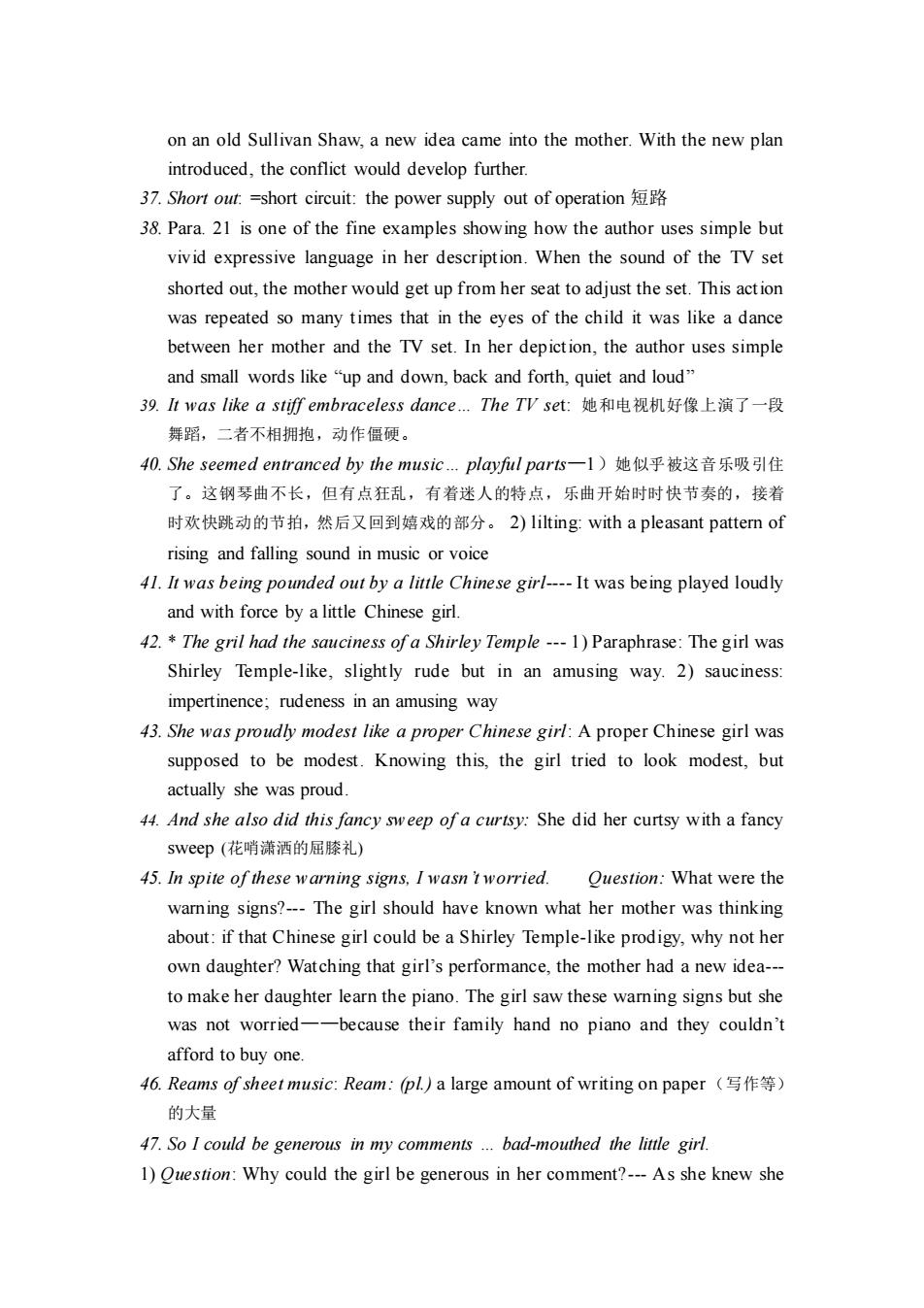
on an old Sullivan Shaw,a new idea came into the mother.With the new plan introduced,the conflict would develop further. 37.Short out.=short circuit:the power supply out of operation 38.Para.21 is one of the fine examples showing how the author uses simple but vivid expressive language in her description.When the sound of the TV set shorted out,the mother would get up from her seat to adjust the set.This action was repeated so many times that in the eyes of the child it was like a dance between her mother and the TV set.In her depiction,the author uses simple and small words like"up and down,back and forth,quiet and loud' 39.It was like a stiff embraceless dance.The TV set::她和电视机好像上演了一段 舞蹈,二者不相拥抱,动作僵硬。 40.She seemed entranced by the music.playful parts一1)她似乎被这音乐吸引住 了。这钢琴曲不长,但有点狂乱,有若迷人的特点,乐曲开始时时快节泰的,接着 时欢快跳动的节拍,然后又回到嬉戏的部分。2)lilting:with a pleasant pattem of rising and falling sound in music or voice 41.It was being pounded out by a little Chinese girl-It was being played loudly and with force by a little Chinese girl. 42.The gril had the sauciness ofa Shirley Temple-1)Paraphrase:The girl was Shirley Temple-like,slightly rude but in an amusing way.2)sauciness: impertinence;rudeness in an amusing way 43.She was proudly modest like a proper Chinese girl:A proper Chinese girl was supposed to be modest.Knowing this,the girl tried to look modest,but actually she was proud 44.And she also did this fancy sweep of a curtsy:She did her curtsy with a fancy sweep(花哨潇洒的屈膝礼) 45.In spite of these warning signs,I wasntworried.Question:What were the waming signs?-The girl should have known what her mother was thinking about:if that Chinese girl could be a Shirley Temple-like prodigy,why not her own daughter?Watching that girl's performance,the mother had a new idea- to make her daughter learn the piano.The girl saw these waming signs but she was not worried-because their family hand no piano and they couldn't afford to buy one. 46.Reams of sheet music:Ream:(pl)a large amount of writing on paper ( 的大量 47.So I could be generous in my comments.bad-mouthed the little girl. 1)Question:Why could the girl be generous in her comment?-As she knew she
on an old Sullivan Shaw, a new idea came into the mother. With the new plan introduced, the conflict would develop further. 37. Short out: =short circuit: the power supply out of operation 短路 38. Para. 21 is one of the fine examples showing how the author uses simple but vivid expressive language in her description. When the sound of the TV set shorted out, the mother would get up from her seat to adjust the set. This action was repeated so many times that in the eyes of the child it was like a dance between her mother and the TV set. In her depiction, the author uses simple and small words like “up and down, back and forth, quiet and loud” 39. It was like a stiff embraceless dance. The TV set: 她和电视机好像上演了一段 舞蹈,二者不相拥抱,动作僵硬。 40. She seemed entranced by the music. playful parts—1)她似乎被这音乐吸引住 了。这钢琴曲不长,但有点狂乱,有着迷人的特点,乐曲开始时时快节奏的,接着 时欢快跳动的节拍,然后又回到嬉戏的部分。 2) lilting: with a pleasant pattern of rising and falling sound in music or voice 41. It was being pounded out by a little Chinese girl- It was being played loudly and with force by a little Chinese girl. 42. * The gril had the sauciness of a Shirley Temple - 1) Paraphrase: The girl was Shirley Temple-like, slightly rude but in an amusing way. 2) sauciness: impertinence; rudeness in an amusing way 43. She was proudly modest like a proper Chinese girl: A proper Chinese girl was supposed to be modest. Knowing this, the girl tried to look modest, but actually she was proud. 44. And she also did this fancy sweep of a curtsy: She did her curtsy with a fancy sweep (花哨潇洒的屈膝礼) 45. In spite of these warning signs, I wasn’t worried. Question: What were the warning signs?- The girl should have known what her mother was thinking about: if that Chinese girl could be a Shirley Temple-like prodigy, why not her own daughter? Watching that girl’s performance, the mother had a new idea- to make her daughter learn the piano. The girl saw these warning signs but she was not worried——because their family hand no piano and they couldn’t afford to buy one. 46. Reams of sheet music: Ream: (pl.) a large amount of writing on paper (写作等) 的大量 47. So I could be generous in my comments . bad-mouthed the little girl. 1) Question: Why could the girl be generous in her comment?- As she knew she
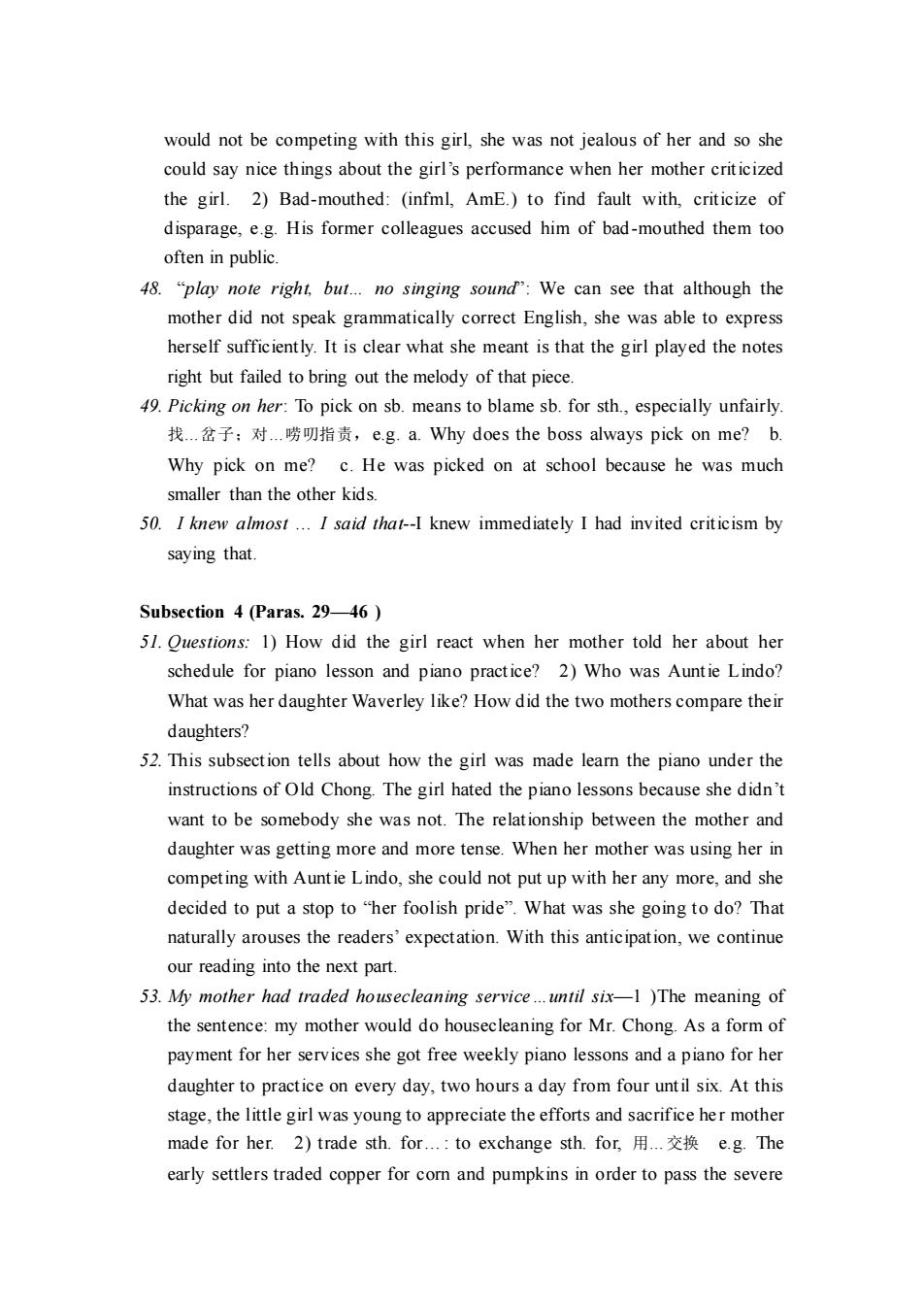
would not be competing with this girl,she was not jealous of her and so she could say nice things about the girl's performance when her mother criticized the girl.2)Bad-mouthed:(infml,AmE.)to find fault with,criticize of disparage,e.g.His former colleagues accused him of bad-mouthed them too often in public. 48."play note right,but.no singing sound":We can see that although the mother did not speak grammatically correct English,she was able to express herself sufficiently.It is clear what she meant is that the girl played the notes right but failed to bring out the melody of that piece. 49.Picking on her:To pick on sb.means to blame sb.for sth.,especially unfairly 找岔子:对.唠叨指责,e,g.a.Why does the boss always pick on me?b. Why pick on me?c.He was picked on at school because he was much smaller than the other kids. 50.I knew almost.I said that-I knew immediately I had invited criticism by saying that. Subsection 4(Paras.29-46) 51.Ouestions:1)How did the girl react when her mother told her about her schedule for piano lesson and piano practice?2)Who was Auntie Lindo? What was her daughter Waverley like?How did the two mothers compare their daughters? 52.This subsection tells about how the girl was made leam the piano under the instructions of Old Chong.The girl hated the piano lessons because she didn't want to be somebody she was not.The relationship between the mother and daughter was getting more and more tense.When her mother was using her in competing with Auntie Lindo,she could not put up with her any more,and she decided to put a stop to"her foolish pride".What was she going to do?That naturally arouses the readers'expectation.With this anticipation,we continue our reading into the next part. 53.My mother had traded housecleaning service.until six-1 )The meaning of the sentence:my mother would do housecleaning for Mr.Chong.As a form of payment for her services she got free weekly piano lessons and a piano for her daughter to practice on every day,two hours a day from four until six.At this stage,the little girl was young to appreciate the efforts and sacrifice her mother made for her.2)trade sth.for:to exchange sth.for用.交换e.g.The early settlers traded copper for corn and pumpkins in order to pass the severe
would not be competing with this girl, she was not jealous of her and so she could say nice things about the girl’s performance when her mother criticized the girl. 2) Bad-mouthed: (infml, AmE.) to find fault with, criticize of disparage, e.g. His former colleagues accused him of bad-mouthed them too often in public. 48. “play note right, but. no singing sound”: We can see that although the mother did not speak grammatically correct English, she was able to express herself sufficiently. It is clear what she meant is that the girl played the notes right but failed to bring out the melody of that piece. 49. Picking on her: To pick on sb. means to blame sb. for sth., especially unfairly. 找.岔子;对.唠叨指责,e.g. a. Why does the boss always pick on me? b. Why pick on me? c. He was picked on at school because he was much smaller than the other kids. 50. I knew almost . I said that-I knew immediately I had invited criticism by saying that. Subsection 4 (Paras. 29—46 ) 51. Questions: 1) How did the girl react when her mother told her about her schedule for piano lesson and piano practice? 2) Who was Auntie Lindo? What was her daughter Waverley like? How did the two mothers compare their daughters? 52. This subsection tells about how the girl was made learn the piano under the instructions of Old Chong. The girl hated the piano lessons because she didn’t want to be somebody she was not. The relationship between the mother and daughter was getting more and more tense. When her mother was using her in competing with Auntie Lindo, she could not put up with her any more, and she decided to put a stop to “her foolish pride”. What was she going to do? That naturally arouses the readers’ expectation. With this anticipation, we continue our reading into the next part. 53. My mother had traded housecleaning service.until six—1 )The meaning of the sentence: my mother would do housecleaning for Mr. Chong. As a form of payment for her services she got free weekly piano lessons and a piano for her daughter to practice on every day, two hours a day from four until six. At this stage, the little girl was young to appreciate the efforts and sacrifice he r mother made for her. 2) trade sth. for.: to exchange sth. for, 用.交换 e.g. The early settlers traded copper for corn and pumpkins in order to pass the severe

winter. 54.My mother slapped me-This tells us two things.First,the mother was rather quick-tempered.Secondly,we are reminded that she was a Chinese mother. American parents would have hesitated to use physical punishment in dealing with their children 55."Who ask you be genius?.You think I want you be genius?"-The correct way of saying should be:Who asks you to be a genius?I only ask you to be at your best.For your sake.You think I want you to be a genius? 56."So ungrateful':Question:What do you think of the mother's words,namely what is the implied meaning in it?-This reflects an important Chinese value concerning the relationship between parents and children.The parents do everything they can for their children and the children are supposed to feel grateful to their parents.The typical American idea is that since the parents have brought their children into this world,they have obligations for their children,and so the children do not have to feel that they own anything to their parents 57.Like Bethoven!.in our head-Bethoven (1770-1827),world famous German composer,began to lose his hearing when he was only 28 and his 2nd symphony was not yet finished.This was a terrible disaster the young musician Public performance eventually became impossible,but he never stopped composing.At first,he could not bear to let anyone know of his tragedy.In a letter he wrote to his brother about his deafness in 1802,he said:"What humiliation when anyone standing beside me could hear a distant flute that I could not hear,or a shepherd singing.and I could not distinguish a sound! Such circumstances brought me to the brink of despair and almost made me put an end to my life:nothing but my art held my hand."The disease worsened, and he became completely deaf in 1807.In spite of his deafness,Bethoven went on working with all his strength,though he was never able to hear most of his own finest music. 58.An old,unreachable itchthe word "itch"has two meanings.An itch is an uncomfortable feeling on your skin that makes you want to rub it with your nails.Informally it means figuratively a strong desire to do or have something. 59.Keep rime-to play a piece of music suing the right rhythm and speed. 确的节奏)There are other phrases about music with the word“time”in them. e.g.a.Waltzes are usually in three-four time.b.He went through the motions in half-time c.She began moving her body in time to the music
winter. 54. My mother slapped me—This tells us two things. First, the mother was rather quick-tempered. Secondly, we are reminded that she was a Chinese mother. American parents would have hesitated to use physical punishment in dealing with their children. 55. “ Who ask you be genius?.You think I want you be genius?”—The correct way of saying should be: Who asks you to be a genius? I only ask you to be at your best. For your sake. You think I want you to be a genius? 56. “So ungrateful”: Question: What do you think of the mother’s words, namely what is the implied meaning in it? -This reflects an important Chinese value concerning the relationship between parents and children. The parents do everything they can for their children and the children are supposed to feel grateful to their parents. The typical American idea is that since the parents have brought their children into this world, they have obligations for their children, and so the children do not have to feel that they own anything to their parents. 57. Like Bethoven!.in our head—Bethoven (1770—1827) ,world famous German composer, began to lose his hearing when he was only 28 and his 2nd symphony was not yet finished. This was a terrible disaster the young musician. Public performance eventually became impossible, but he never stopped composing. At first, he could not bear to let anyone know of his tragedy. In a letter he wrote to his brother about his deafness in 1802, he said: “What humiliation when anyone standing beside me could hear a distant flute that I could not hear, or a shepherd singing, and I could not distinguish a sound! Such circumstances brought me to the brink of despair and almost made me put an end to my life: nothing but my art held my hand.” The disease worsened, and he became completely deaf in 1807. In spite of his deafness, Bethoven went on working with all his strength, though he was never able to hear most of his own finest music. 58. An old, unreachable itch—the word “itch” has two meanings. An itch is an uncomfortable feeling on your skin that makes you want to rub it with your nails. Informally it means figuratively a strong desire to do or have something. 59. Keep time—to play a piece of music suing t he right rhythm and speed. (保持正 确的节奏) There are other phrases about music with the word “time” in them. e.g. a. Waltzes are usually in three-four time. b. He went through the motions in half-time c. She began moving her body in time to the music